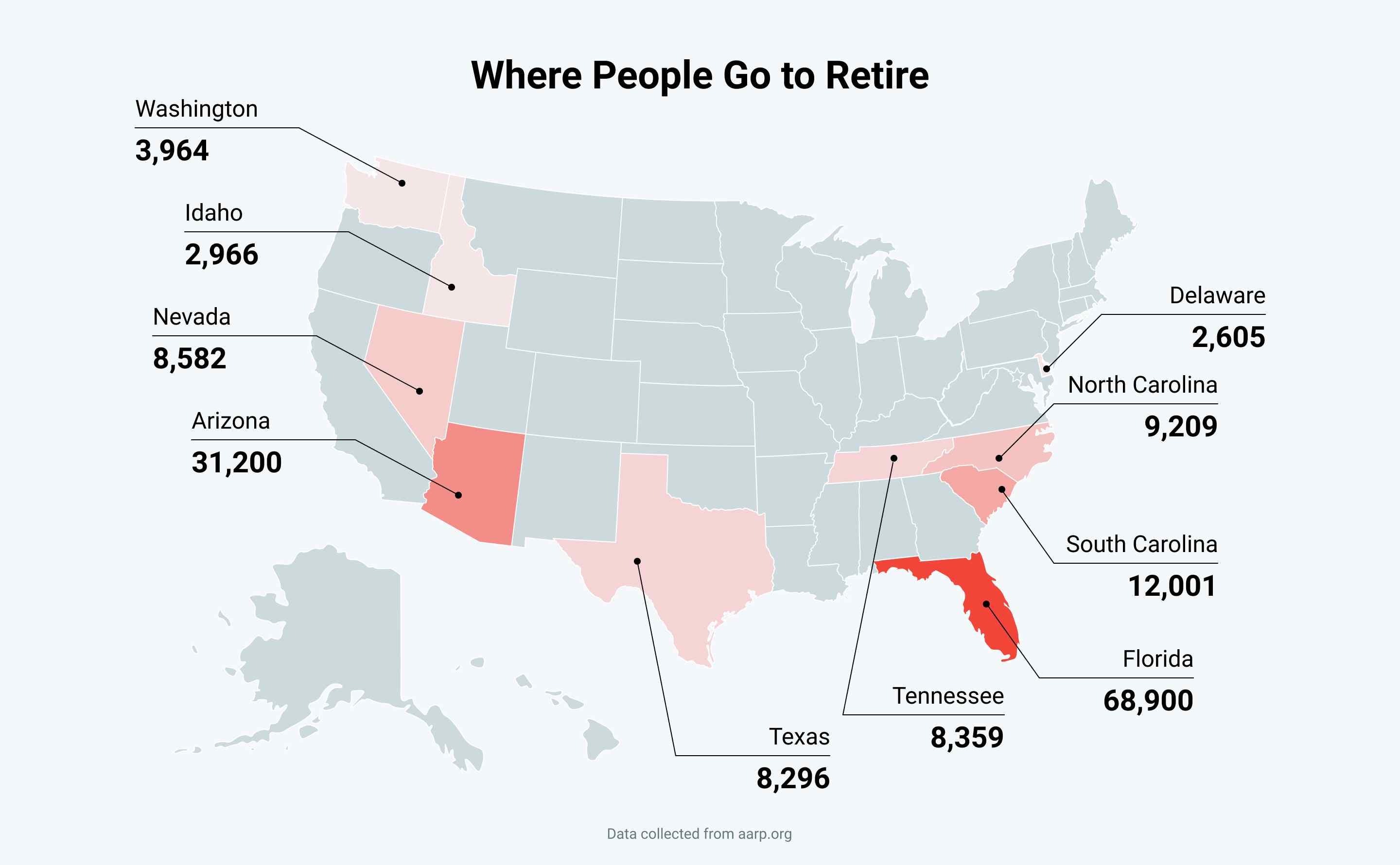Moving Guide After Retirement
For many working professionals, retirement is a huge milestone. It signals the end of your career and the beginning of a new chapter in your life — one with adjusted goals, needs, and, best of all, free time.
Many retirees choose to spend their retirement in an entirely new environment. Of course, uprooting your life comes with a whole new set of challenges for seniors. Still, there are many reasons to relocate, and with careful planning, you will be able to mitigate many of the common problems seniors face when moving after retirement.
Moving Statistics During Retirement
Almost 400,000 Americans moved from their home states to retire last year. A data study based on the US. Census Bureau’s Current Population Survey found that 30% more seniors relocated for retirement than years prior. In addition, 38% of seniors who relocated chose to leave their state. That’s nearly 20% more than the general population.
Some of the main reasons retirees cite for leaving the state they previously lived and worked in are tax-friendliness, access to healthcare, and a lower cost of living
The American Association of Retired Persons (AARP) collected data on the net migration patterns of people over 60. They found the following states to have the highest net migrations of seniors:
- Florida (68,900)
- Arizona (31,200)
- South Carolina (12,001)
- North Carolina (9,209)
- Nevada (8,582)
- Tennessee (8,359)
- Texas (8,296)
- Washington (3,964)
- Idaho (2,966)
- Delaware (2,605)
As the visual below illustrates, Florida is the most popular retirement destination in the U.S. That’s likely because of its friendly beaches and friendlier tax laws.

Florida has long been a popular destination for the newly-retired. A whopping 20.5% of the state’s population is made up of senior citizens. The U.S. Census Bureau estimates that figure will be 32.5 by the year 2030.
Florida has the largest manufactured communities of people aged 55 and up. These communities are enticing for their affordability, swimming pools, and organized activities. Many seniors enjoy this sort of environment, which offers a permanent vacation in what feels like resort living.
Reasons to Relocate
There’s plenty of reasons why so many seniors relocate after they retire. Retirement is often the perfect chance to make major life changes that may not have been possible while you were working. Below are some of the most common reasons for retirement relocation.
Be Closer to Loved Ones
Many seniors take advantage of their newfound spare time by spending it with family. Maintaining a strong support network is essential for anyone, especially for new retirees who might live alone. For this reason, it’s extremely common for seniors to move to be closer to loved ones. It’s also common for older seniors to move closer to friends and family to have assistance with daily tasks.
Increase Quality of Life
As people change with age, so do their desires and goals for their life. Retirement provides an out for someone to move to the place they’ve been dreaming of. For example, after years working in a large metropolitan area, many seniors find a remote farmhouse to be the perfect place to live out their golden years. Many seniors find they simply don’t have the energy to navigate large cities or shovel snow out of their driveway. Living somewhere better suited to a retiree’s desired lifestyle can be a huge boost to their quality of life.
Change Living Arrangements
Sometimes, relocation is spurred on by a desire or need to change up living arrangements. For example, seniors who live alone might not need the space they used to. Maintaining a large property might become a burden that retirees don’t want to bother with anymore. Many people who live alone decide to downsize their living space as their needs change. In other situations, retirees transition from a house or apartment to a senior living community.
Cut Living Costs
Some parts of the U.S. are experiencing soaring living costs. For someone who is no longer working, keeping up with these rising costs may prove impossible. Many people, including retirees, are moving from densely populated, expensive areas to more remote locations. In the last couple of years, record numbers of people have been moving out of California in favor of cheaper states to live in, like Texas, Oregon, Washington, Colorado, and Florida. Retirees are a large portion of those moving. This goes hand-in-hand with increasing quality of life, as seniors often find they don’t have to scrimp and save to live in an expensive area and can instead live a more modest lifestyle.
Medical Reasons
If you’re entering an early retirement, then this may not apply to you as much. Often, older retirees find themselves in need of more intensive or specialized medical care. New medical needs may be the reason they retired in the first place. Specialized health services or disability resource centers may not be available in every location. Or, perhaps their health insurance does not cover services available to them in their current location. Retirees will, therefore, often move to cities where they can get sufficient medical care for a reasonable price.
Moving Challenges After Retirement

Relocating can be an instant boost to the quality of life for all the above reasons, but it’s not all roses and sunshine. Moving is hard enough for the young and spry and that much harder for retirees who have a lot of business to take care of before they’re ready to move.
Stress
An uncertain and new situation can create a lot of stress, especially for someone leaving a place after many years of living there. For people leaving places where their roots run deep, moving home can be especially stressful and emotional. Stress is negatively impactful to so many areas of health, from mental to physical. Stress can interfere with the body’s well-being and balance. Therefore, seniors should be mindful of the stress they may potentially experience when moving and make an effort to reduce that stress as much as possible so it doesn’t wear on their mind and body.
Logistics
The logistics of moving take a lot of planning and legwork. This includes timing, travel time, transportation, and the process of packing itself. All of the above have to be coordinated, which can be a major pain for retirees who don’t have help.
Selling
Selling a house is no small task. You have to deal with extensive paperwork and property deeds, hire a realtor, and--perhaps most difficult--find a buyer. Not to mention the property owner often has to do some fixing up and renovations before they can sell. The older a house is, or the worse condition it’s in, the harder it is to sell and the longer it will take to get the house in good enough shape to be desirable. Then there’s the matter of timing. If it’s not a seller’s market, you may not be able to make as much on the property as you want. This may also limit your ability to relocate.
Buying
On the flip side of problems associated with selling your property are problems with buying a property. Sometimes finding a suitable home in a new location can be difficult, and it may take a lot longer than expected. Sometimes buyers have to rely on temporary housing after they’ve already sold their old property, in which case storage for their belongings can be an issue. Buying property also comes with its expenses: appraisal, attorney fees, inspection fees, loans, title insurance, and more.
Moving Tips for Retirees: What to Consider Before Moving
There are many things you should think about when deciding whether and where to move. First and foremost, you need to be sure that the necessities are taken care of.
In addition to basic considerations, like how well members of your household (spouse, children/grandchildren, pets) will be able to adjust to their new environment, consider the following points:
- Cost of living. Will you be able to afford to live in this new location? Be sure you are aware of all the hidden costs that go along with a particular place. For example, if you live somewhere with extreme weather conditions, are you prepared to pay a high electric bill in the winters and/or summers?
- Property taxes. Property taxes vary wildly depending on where you live. They are calculated differently from state to state, so be sure you are aware of what you will be paying in property taxes before the bills are due.
- Transportation. How easy will it be to get around? If you rely on public transportation, it’s worth looking into how robust your new location’s public transportation system is. Likewise, if you rely on driving, it’s important to know whether destinations around the city are accessible by car and how much maintaining a vehicle will cost you.
- Access to medical care. If you have a condition that requires advanced and specialized care, it’s vital that you have a plan for continued treatment. Some places don’t have the health services you may need. It’s better to find this out sooner rather than later.
- Language. It goes without saying that if you’re planning to move to a region where your native or learned language(s) is not commonly spoken, this may be a considerable barrier.
- Climate. Some climates are harder on older bodies than others. For example, areas that reach freezing temperatures may not be particularly suitable for seniors.
- Proximity to family, friends, and hobbies--basically, all the things that make your life rich. If you love scuba diving and your family lives in Hawaii, Arizona may not be the place for you.
Rent Before Buying
All of the above points will contribute to your happiness and wellness in a new location, so it’s important to examine an area before every angle. Many experts suggest renting a property before buying so that you have a good idea of what it’s actually like to live there--not just what the travel brochure tells you.
Don’t Rush If You Don’t Have To
Buying a house across the country from your current location is not something to rush into if you can avoid it. Of course, plenty of scenarios, like family or medical emergencies, require quick action. Above all, if you have the time to make a careful decision, use it.
Final Considerations

While it’s true that moving house can be a frustrating and challenging process that may not go as planned, many find that the rewards outweigh the risks. With everything you’ve experienced in life by the time you retire, you know that nothing worth getting comes easy. With time, careful planning, and help from trusted loved ones (or professionals like financial advisors, lenders of cash advances, and moving companies), relocating may end up being one of the best decisions you can make.





